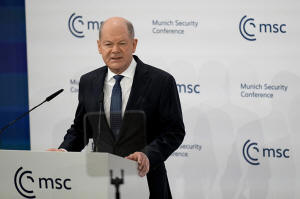Zelenskyy says time has come for the creation of 'armed forces of
Europe'
 Send a link to a friend
Send a link to a friend
 [February 15, 2025]
By PHILIPP JENNE [February 15, 2025]
By PHILIPP JENNE
MUNICH (AP) — Ukrainian President Volodymyr Zelenskyy said Saturday the
time has come for the creation of an “armed forces of Europe” and that
his country’s fight against Russia has proved that a foundation for it
already exists.
The Ukrainian leader said Europe cannot rule out the possibility that
“American might say no to Europe on issues that threaten it,” and noted
that many leaders have long spoken about how Europe needs its own
military.
“I really believe that time has come,” Zelenskyy told the Munich
Security Conference. “The armed forces of Europe must be created.”
Zelenskyy also alluded to a phone conversation between U.S. President
Donald Trump and Russian President Vladimir Putin, after which Trump
said the two leaders would likely meet soon to negotiate a peace deal
over Ukraine. Trump later assured Zelenskyy that he, too, would have a
seat at the table to end the war that was sparked by Russia’s full-scale
invasion of Ukraine in 2022.
“Ukraine will never accept deals made behind our backs without our
involvement, and the same rule should apply to all of Europe," Zelenskyy
said.
“A few days ago, President Trump told me about his conversation with
Putin. Not once did he mention that America needs Europe at the table.
That says a lot," he added. “The old days are over when America
supported Europe just because it always had.”
Zelenskyy insisted that "three years of full-scale war have proven that
we already have the foundation for a united European military force. And
now, as we fight this war and lay the groundwork for peace and security,
we must build the armed forces of Europe.”
Noting the presence of NATO Secretary-General Mark Rutte in the
audience, Zelenskyy said his idea “wasn’t about replacing the alliance.
This is about making Europe’s contribution to our partnership equal to
America’s.”
German chancellor responds to Vance
He spoke shortly after German Chancellor Olaf Scholz took aim at the new
political tack from Washington under the Trump administration. Scholz
shot back strongly in defense of his stance against the far-right and
said his country won’t accept people who “intervene in our democracy” —
alluding to remarks by U.S. Vice President JD Vance who scolded European
leaders over their approach to democracy.
Even while lashing out at alleged U.S. meddling in Germany’s election
next week, Scholz said he was “pleased” at what he called a shared
commitment with the United States to the “preserving the sovereign
independence of Ukraine,” and agreed with Trump that the Russia-Ukraine
war must end.
Polls show the far-right Alternative for Germany (AfD) party — whose
co-leader met with Vance on Friday — currently in second, ahead of
Scholz’s own Social Democrats.

[to top of second column]
|

Germany's Chancellor Olaf Scholz speaks during the Munich Security
Conference at the Bayerischer Hof Hotel in Munich, Germany,
Saturday, Feb. 15, 2025. (AP Photo/Matthias Schrader)

But when it came to domestic politics, Scholz also alluded to
Germany's Nazi past, and said the longstanding commitment to “Never
Again” — a return to the extreme right — was not reconcilable with
support for AfD.
“We will not accept that people who look at Germany from the outside
intervene in our democracy and our elections and in the democratic
opinion-forming process in the interest of this party,” he said.
“That’s just not done, certainly not amongst friends and allies. We
resolutely reject this.”
“Where our democracy goes from here is for us to decide,” Scholz
added.
A day earlier, Vance that he fears free speech is “in retreat”
across the continent.
He said that many Americans saw in Europe "entrenched interests
hiding behind ugly Soviet-era words like misinformation and
disinformation, who simply don’t like the idea that somebody with an
alternative viewpoint might express a different opinion or, God
forbid, vote a different way, or even worse, win an election.”
Scholz, shooting back, said “free speech in Europe means that you
are not attacking others in ways that are against legislation and
laws we have in our country." He was referring to rules in Germany
that restrict hate speech.
Europe looking for clues from new US administration
European leaders have been trying to make sense of a tough new line
from Washington on issues including democracy and Ukraine's future,
as the Trump administration continues to upend transatlantic
conventions that have been in place since after World War II.
Zelenskyy said Friday that his country wants security guarantees
before any talks with Russia. Shortly before meeting with Vance in
Munich, Zelenskyy said he will only agree to meet in-person with
Putin after a common plan is negotiated with Trump.
After a 40-minute meeting with Zelenskyy, Vance said the Trump
administration wants the war to end.
Beforehand, Vance lectured European officials on free speech and
illegal migration on the continent, warning that they risk losing
public support if they don’t quickly change course.
“The threat that I worry the most about vis-à-vis Europe is not
Russia. It’s not China. It’s not any other external actor,” Vance
said in a speech that drew a tepid response. “What I worry about is
the threat from within — the retreat of Europe from some of its most
fundamental values, values shared with the United States of
America.”
All contents © copyright 2025 Associated Press. All rights reserved |